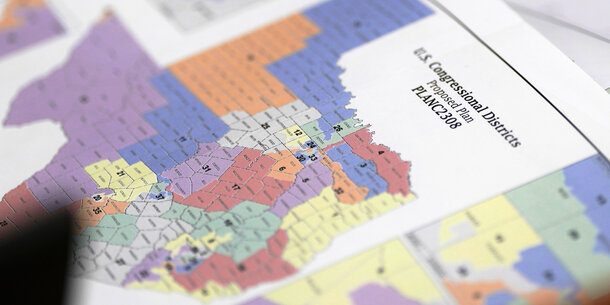In February, North Carolina state courts redrew the general assembly’s congressional map, which violated the state’s constitutional ban on partisan gerrymandering. Now, several of the state’s Republican legislative leaders are feverishly pressing the U.S. Supreme Court to reinstitute the original maps for the upcoming primary elections.
Moore v. Harper is currently on the Court’s “shadow docket,” which is increasingly being used to bypass normal court processes. In the case, the legislators propose a radical reinterpretation of the Constitution known as the “independent state legislature theory” (ISLT), which has been making the rounds in conservative legal circles. The theory is baseless. But more importantly at this moment, the justices would be hard-pressed to find a worse vehicle than Moore to address the ISLT.
The ISLT is based on an implausible reading of the U.S. Constitution’s Elections Clause, which directs states to make rules for congressional elections but also gives Congress overriding power to make entirely new election rules or alter state laws. Under this fringe theory, state legislatures are the only state body that can regulate congressional elections — not governors, state judges, or even state constitutions.
The ISLT is meritless as a matter of originalism, textualism, fair representation, and precedent. (One of many important data points to keep in mind: an unbroken line of Supreme Court cases dating back more than 100 years has rejected the theory.) But stray concurring opinions from the shadow docket around the 2020 election have emboldened ISLT proponents to force the issue on the Court, as the North Carolina legislators are trying to do here. Nevertheless — and notwithstanding some dramatic media coverage — Moore does not present the Court with an opportunity to install the ISLT. There are many reasons why. Let’s spotlight a few.
First, the case simply does not implicate the ISLT’s concern with state constitutions and state courts infringing on the legislature’s supposedly exclusive power to regulate congressional elections. The North Carolina General Assembly itself enacted the state constitutional provisions that prohibit extreme partisan gerrymandering, and the general assembly expressly authorized state courts to remedy unlawful congressional maps. In other words, the general assembly imposed judicial review on itself. Even under the unorthodox reading of the Constitution the legislators are offering, there’s no federal constitutional issue here.
Second, the legislators failed to preserve the ISLT issue. The only question actually presented in the appeal is whether the ISLT somehow forbids a state legislature from inviting such judicial review. The legislators did not make this argument in state court or before the Supreme Court. Maybe because it’s clearly ironic — to be generous — to say that the ISLT gives the legislature infinite power, but not the power to ask its own state’s courts to weigh in. Or perhaps it is because even the few who are sympathetic to the ISLT recognize that the theory does not preclude legislatures from inviting judicial review of the rules they make for federal elections. Or maybe because the originalist evidence against such restrictions is overwhelming. Whatever the reason, the issue is not before the Supreme Court.
Finally, North Carolina’s legislative leaders needlessly waited weeks to file this appeal, and granting their request at this point would create many problems. Less than three months remain until the primary on May 17. The Supreme Court recently held that a January 24 federal court ruling blocking the use of another congressional map was too close to that state’s May 24 primary date. Whatever one makes of that ruling (and we do take issue with it), it precludes the Supreme Court from granting a stay here. If 121 days weren’t enough time for the Supreme Court, less than 75 days clearly aren’t. And a ruling for the legislators would not only upend North Carolina’s elections, it could also unsettle the congressional maps in numerous other states drawn by an entity other than the state legislature or in compliance with state constitutional provisions.
It’s not surprising that ISLT proponents are bending over backwards to get the issue before the Supreme Court, which has all but invited these spurious challenges with its stray shadow docket musings on the ISLT. The practical and doctrinal implications of endorsing the ISLT, however, are too radical to accept. They are especially intolerable in a shadow docket case without oral argument or full briefing. And they are yet even more intolerable where the ISLT isn’t even rightly at issue. No matter what North Carolina’s legislative leaders might hope or pretend, the ISLT has hit a dead end on its path through their state’s courts. The Supreme Court should let this one rest and seriously rethink the chaos it is courting.




